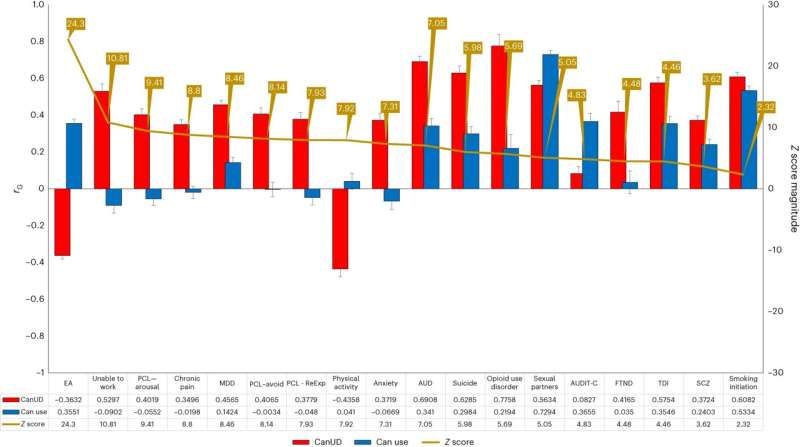This article has been reviewed according to Science X's editorial process and policies. Editors have highlighted the following attributes while ensuring the content's credibility:
fact-checked
peer-reviewed publication
trusted source
proofread
Genomic study links cannabis abuse to multiple health problems

A Yale-led analysis of the genomes of more than 1 million people has shed light on the underlying biology of cannabis use disorder and its links to psychiatric disorders, abuse of other substances such as tobacco, and possibly even an elevated risk of developing lung cancer.
For the study, researchers examined a genome-wide set of genetic variants in individuals from multiple ancestry groups enrolled in the U.S. Department of Veterans Affairs' Million Veteran Program, one of the world's largest genetic databases, and incorporated additional information from several other genomic databases. They were able to identify dozens of genetic variants linked to cannabis use disorder and a variety of behavioral and health issues associated with cannabis use disorder.
The study, led by Daniel Levey, assistant professor of psychiatry, and Joel Gelernter, the Foundations Fund Professor of Psychiatry and professor of genetics and of neuroscience, was published Nov. 20 in the journal Nature Genetics.
"Once we understand the biology of cannabis use disorder, we can better understand associated disorders and inform the public of risks associated with marijuana use," said Levey, lead author of the study.
Marijuana is the most commonly used federally illegal drug in the United States, with more than 48 million people (18% of Americans) using it at least once in 2019, according to the U.S. Centers for Disease Control and Prevention. Previous research has shown that roughly one-third of people who use marijuana develop cannabis use disorder, which is defined as a problematic pattern of cannabis use leading to clinically significant impairment or distress.
The new findings offer insights into the genetic factors that underlie this phenomenon, and other potentially related health risks.
For instance, they found that variants of genes that encode for three different types of receptors on neurons were associated with elevated risk for developing cannabis use disorder.
And they found that these variants linked to cannabis use disorder were also associated with the development of lung cancer. The authors added, however, that more work needs to be done to separate the effects tobacco use and other environmental factors have on cancer diagnoses from those of marijuana use.
"This is the largest genome-wide study of cannabis use disorder ever conducted and as more states legalize or decriminalize the use of marijuana, such studies can help us to understand the public health risks that accompany its increased use," Gelernter said.
More information: Daniel F. Levey et al, Multi-ancestry genome-wide association study of cannabis use disorder yields insight into disease biology and public health implications, Nature Genetics (2023). DOI: 10.1038/s41588-023-01563-z




















